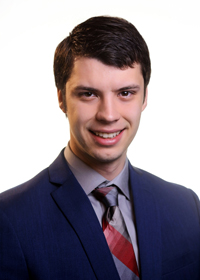William Moses became addicted to scientific research as a high school student. The dependency has served him well. Moses, who was selected for a DOE Computational Science Graduate Fellowship (CSGF) in 2018, now is completing his doctorate at the Massachusetts Institute of Technology.
Moses grew up in Virginia, just outside Washington. That gave him access to hands-on science at the Naval Research Laboratory, where his work focused on wireless communications.
He “enjoyed it, specifically the ability to solve problems and think through different ways of doing things.” Soon, he was also writing his own code.
As an undergraduate in 2015 and 2016, he landed an engineering internship in software and propulsion with SpaceX in Hawthorne, California. At the time, he was torn between physics and computer science.
“That was a good way to do both at the same time,” he says.
Next came a summer 2017 internship with Facebook AI Research in New York City and Paris. The following summer he returned to California as a researcher in the quantum algorithms group at Lawrence Berkeley National Laboratory.
Moses’ DOE CSGF practicum from January to July 2021 at Argonne National Laboratory in Illinois coincided with the COVID-19 pandemic. After a purely virtual practicum, he had to wait more than two years for his first lab visit.
His Argonne advisors were Johannes Doerfert and Paul Hovland. Moses’ work there yielded a publication on a tool called Enzyme that earned a best student paper nomination at the SC21 supercomputing conference. Doerfert also co-mentored Moses during the Google Summer of Code in 2019. Moses’ presentation on the project tied for best student talk at the LLVM Dev Fall ‘19 conference.
More recently, at the SC22 supercomputing conference in Dallas, Moses, Doerfert and six colleagues collaborated on an award-winning paper.
Early on at MIT, Moses began writing code for compilers, software that converts programming into instructions for computers to execute. Charles Leiserson of MIT’s Computer Science and Artificial Intelligence Laboratory got him hooked on LLVM, a compiler technology for high-performance computing.
Moses co-authored a paper with Leiserson and Tao Schardl on an optimization approach called Tapir (Task Asymmetric Parallel Information Retrieval). The approach won the best paper award at the 2017 Symposium on Principles and Practice of Parallel Programming.
Tapir has become a popular animal. Moses later expanded on its capabilities and others have now adopted the approach for added parallel compiler frameworks.
